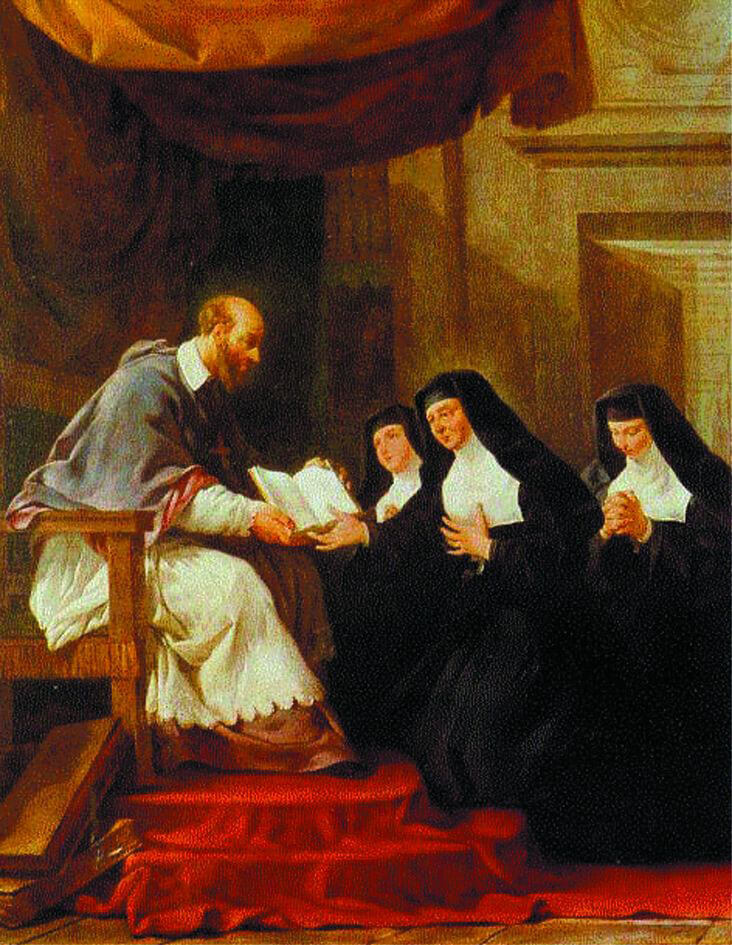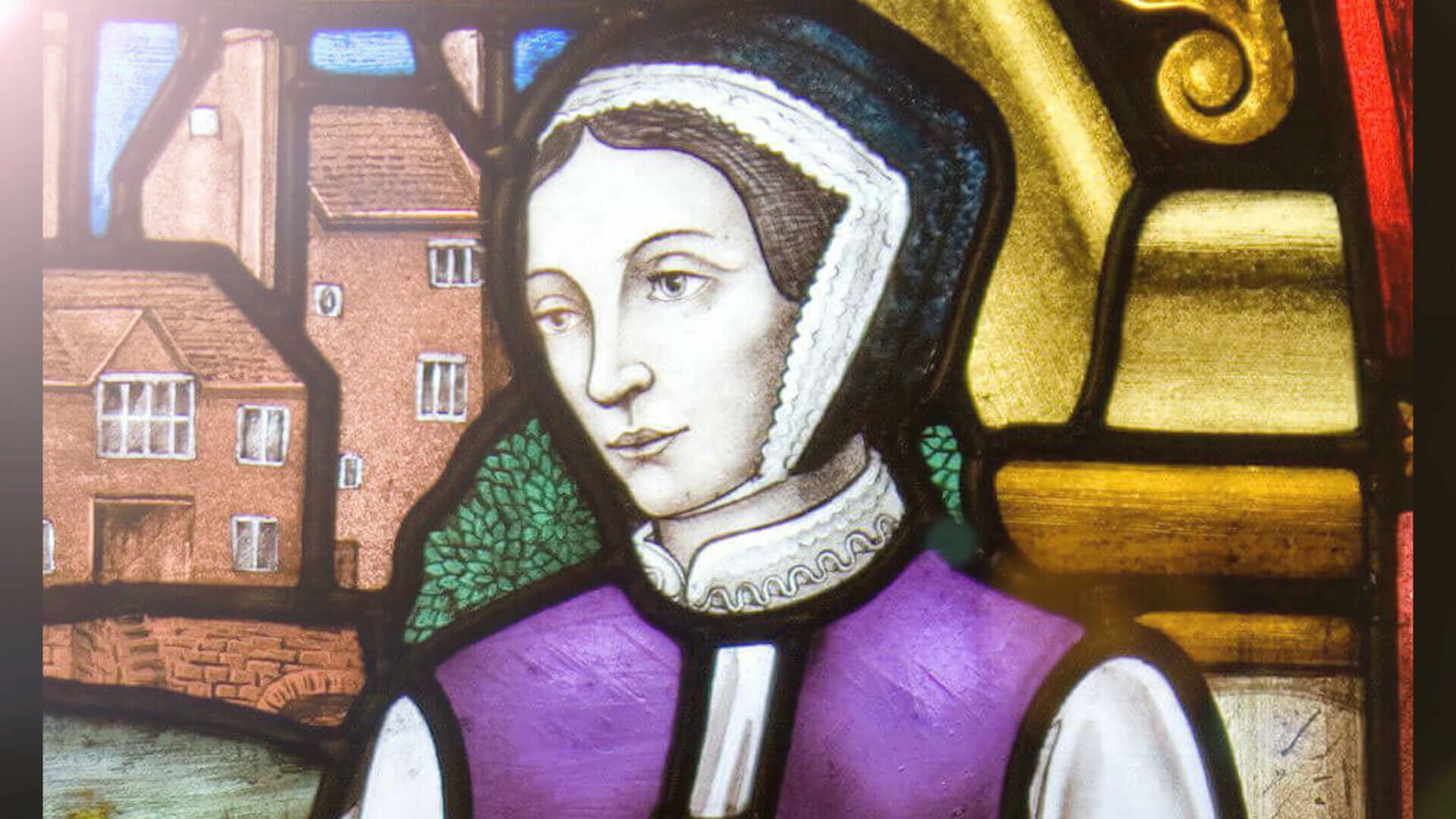
St. Jane de Chantal, whose feast we celebrate on August 12th, lived a life that was full of adversity. As a wife, mother, widow, foundress, and nun, she experienced more than one vocation and each inflicted its own portion of suffering.
When Jane was only eighteen months old, her mother died. Jane herself would lose her first two children soon after childbirth, and although she was to have four more children, three of them would die quite young. Her only sister, to whom she was very close, died as well.
In a freak accident, her beloved husband was shot at near-range when the gun of his friend and hunting buddy went off as they walked. Her husband suffered for nine agonizing days before finally succumbing to his wounds.
Due to her great losses, St. Jane de Chantal suffered a darkness of the soul that nearly incapacitated her.
Later, after meeting St. Francis de Sales at a Lenten retreat, he became the spiritual director she had begged God to send her—yet her interior sorrows persisted.

Eventually, St. Francis deSales told Jane about his plan to form an active religious order of women dedicated to good works following the example of the Blessed Mother’s visitation to St. Elizabeth. This order would be unique in that it would accept women who were turned down by other convents due to age or infirmity.
Francis wanted Jane to assist him in this foundation not only because it was innovative for the time, but also because he needed her strength and prudence to manage it while he attended to his other responsibilities.
“God has given [Jane] to me,” Francis de Sales said. “She has come to be my daughter in order that I may teach her to die to the world and to live to Jesus Christ.”
Before she could embark upon this cause for him, Jane first had to discharge her domestic duties, and give an account for each of them to her father before she could obtain his permission to enter the religious life. Her father questioned her carefully about her plans, in the presence of St. Francis de Sales, to see if she had thought about every detail. Assuring him that she had, Jane became the Mother Superior of the Visitation sisters, employing everything she had learned from her previous experience in home life.
Death still continued to haunt Jane in religious life, however. Both her father and her father-in-law died, as well as some of her spiritual daughters. Jane’s sorrow threatened her ability to perform her duties, but she fought hard not to allow her grief to conquer her mind. She prayed the following fiat every day:
O my Lord Jesus Christ, I desire never again to choose for myself! Touch that chord in my lute that is pleasing to Thyself, and it shall ever and for ever give back this single sound: “Yes, Lord Jesus, may Thy will be done, with no ifs, with no buts, with no exceptions, whether it be for fathers, for children, for myself, and for all other things whatsoever.”
St. Jane de Chantal
One morning, while experiencing a spiritual and emotional sorrow that caused agony in her soul, she wrote a letter to St. Francis de Sales. This little known letter reveals the depth of her weariness and her sincere appeal to God for mercy. It also shows the humility of this great saint.
Here is the letter she wrote:
I write because I cannot refrain from doing so; for this morning I am more wearisome to myself than usual. My interior state is so gravely defective that, in anguish of spirit, I see myself giving way on every side.
Assuredly, my good Father, I am almost overwhelmed by this abyss of misery. The presence of God, which was formerly such a delight to me, now makes me tremble all over and shudder with fear. I bethink myself that the divine eye of Him whom I adore, with entire submission, pierces right through my soul looking with indignation upon all my thoughts, words and works.
Death itself, it seems to me, would be less painful to bear than the distress of mind which this occasions, and I feel as if all things had power to harm me. I am afraid of everything; I live in dread, not because of harm to myself, but because I fear to displease God. Oh, how far away His help seems! thinking of this I spent last night in great bitterness and could utter no other words than these, “My God, my God, alas! why hast Thou forsaken me.”
At daybreak God gave me a little light in the highest part of my soul, yet only there; but it was almost imperceptible; nor did the rest of my soul and its faculties share the enjoyment, which lasted only about the time of half a Hail Mary, then, trouble rushed back upon me with a mighty force, and all was darkness.
Notwithstanding the weariness of this dereliction, I said, though in utter dryness, “Do, Lord, whatever is pleasing to Thee, I wish it. Annihilate me, I am content. Overwhelm me, I most sincerely desire it. Tear out, cut, burn, do just as Thou pleasest, I am Thine.”
God has shown me that He does not make much account of faith that comes of sentiment and emotions.
This is why, though against my inclination, I never wish for [felt] devotion. I do not desire it. God is enough for me.
St. Jane de Chantal
Notwithstanding my absolute misery I hope in Him, and I trust He will continue to support me so that His will may be accomplished in me. Take my feeble heart into your hands, my true Father and Lord, and do what you see to be wisest with it.
In this letter, the heartfelt plea of St. Jane de Chantal is palpable. She is in pain—yet she wants God’s will. She feels like God is not there, or that her soul offends Him, yet she overcomes this felt experience with the clear, unemotional knowledge that God IS with her.
She knows that emotions and “feelings” of faith and consolation are not proof of such things nor are they signs of spiritual advancement. Instead, the most powerful act of faith is the one made in darkness. In such darkness does faith prove that it is genuine.

When we ourselves are faced with intense sorrow, sleepless nights, fears for a loved one, or a troubled soul, may we recall this letter and—like St. Jane de Chantal—turn it all over to our true “Father and Lord to do whatever is pleasing to Him.”
May we remember, too, that even though the saints were close to God, many of them were sometimes permitted to suffer the pain of feeling far away from Him. Like St. Catherine of Siena and St. Faustina Kowalska, St. Jane de Chantal’s suffering did not keep her from offering Jesus her heart and placing her hope and trust in the will of her Heavenly Father.
May we, too, place our trust in Jesus in all things and in all ways, every day of our lives. And may we look to the saints for guidance.
St. Jane de Chantal, pray for us!
What did you think of St. Jane’s letter?
Was it helpful to know that a saint suffered as deeply as you have?
We’d love to hear your thoughts in the comments below!






